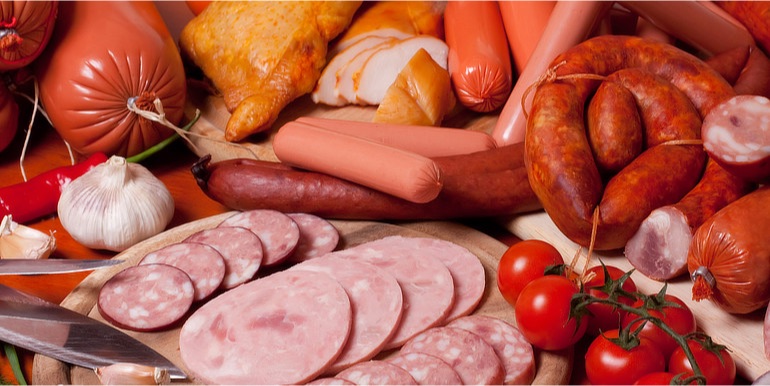Processed and red meats are linked to cancer, says IARC
The International Agency for Research on Cancer (IARC), the cancer agency of the World Health Organization, has evaluated the carcinogenicity of the consumption of red meat and processed meat. A summary of the evaluations has been published in The Lancet Oncology [1].
Image credit: depositphotos.com
A Working Group of 22 experts from 10 countries convened by the IARC Monographs Programme has thoroughly reviewed the conclusions of more than 800 studies that investigated associations of more than a dozen types of cancer with the consumption of red meat or processed meat. These studies were performed in many countries and on various populations with diverse diets. The consumption of meat varies greatly between countries, with from a few percent up to 100% of people eating red meat, depending on the country, and somewhat lower proportions eating processed meat. So what are the final conclusions of such a thorough research?
- Red meat was classified as “probably carcinogenic to humans” (Group 2A), based on limited evidence that the consumption of red meat causes cancer in humans and strong mechanistic evidence supporting a carcinogenic effect. This association was observed mainly for colorectal cancer, but associations were also seen for pancreatic cancer and prostate cancer.
- Processed meat was classified as “carcinogenic to humans” (Group 1), based on sufficient evidence in humans that the consumption of processed meat causes colorectal cancer.
The most influential evidence came from large prospective cohort studies conducted over the past 20 years. Does it imply that people should give up eating red meat and processed meat entirely as a prevention measure?
The answer is not as straightforward as it might seem. If a specific foodstuff is classified as “probably carcinogenic to humans”, it does not imply that all people who eat it will develop cancer later in life. If someone decides to eliminate red meat from his/her diet altogether, he/she will probably lack some important nutrients which are not so abundant in other types of food. On the other hand, nutrition experts have repeatedly pointed out the excessive consumption of red meat in developed countries: in some areas, more than 200 g of red meat are consumed per person per day [2]. As regards processed meats (which include smoked meat, sausages, hot dogs, ham, etc.), incontestable evidence on their carcinogenic effects has accumulated over the years [3, 4]. The latest conclusions of the IARC expert panel can therefore be considered as another piece of the jigsaw puzzle called “healthy diet”. By all means, people should eat a balanced diet, not preferring one type of food to another.
“These findings further support current public health recommendations to limit intake of meat,” says Dr Christopher Wild, Director of IARC. “At the same time, red meat has nutritional value. Therefore, these results are important in enabling governments and international regulatory agencies to conduct risk assessments, in order to balance the risks and benefits of eating red meat and processed meat and to provide the best possible dietary recommendations.”
What is classification by IARC?
Compounds or physical factors assessed by IARC are classified into five groups based on the existing scientific evidence for carcinogenicity [5]:
- Group 1 – carcinogenic to humans
- Group 2A – probably carcinogenic to humans
- Group 2B – possibly carcinogenic to humans
- Group 3 – not classifiable as to its carcinogenicity to humans
- Group 4 – probably not carcinogenic to humans
Reference
- Bouvard V, Loomis D, Guyton KZ, et al. Carcinogenicity of consumption of red and processed meat. The Lancet Oncology 2015. doi: 10.1016/S1470-2045(15)00444-1
- Food and Agriculture Organization of the United Nations Statistics Division. Food balance. 2015.
- Alaejos MS, Afonso AM. Factors that affect the content of heterocyclic aromatic amines in foods. Comprehensive Reviews in Food Science and Food Safety 2011. doi: 10.1111/j.1541-4337.2010.00141.x
- Alomiraha H, Al-Zenkia S, Al-Hootia S, et al. Concentrations and dietary exposure to polycyclic aromatic hydrocarbons (PAHs) from grilled and smoked foods. Food Control 2011. doi: 10.1016/j.foodcont.2011.05.024
- Agents classified by the IARC Monographs, volumes 1–114. International Agency for Research on Cancer (IARC), Lyon, France. Available from WWW: http://monographs.iarc.fr/ENG/Classification/
klíčová slova: red meat, processed meat, colorectal cancer, carcinogenicity


